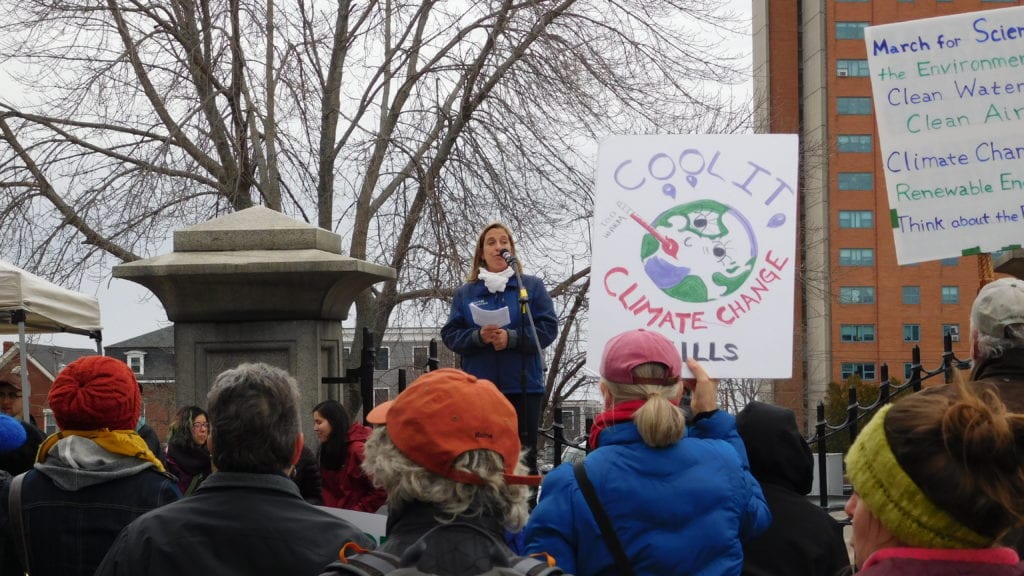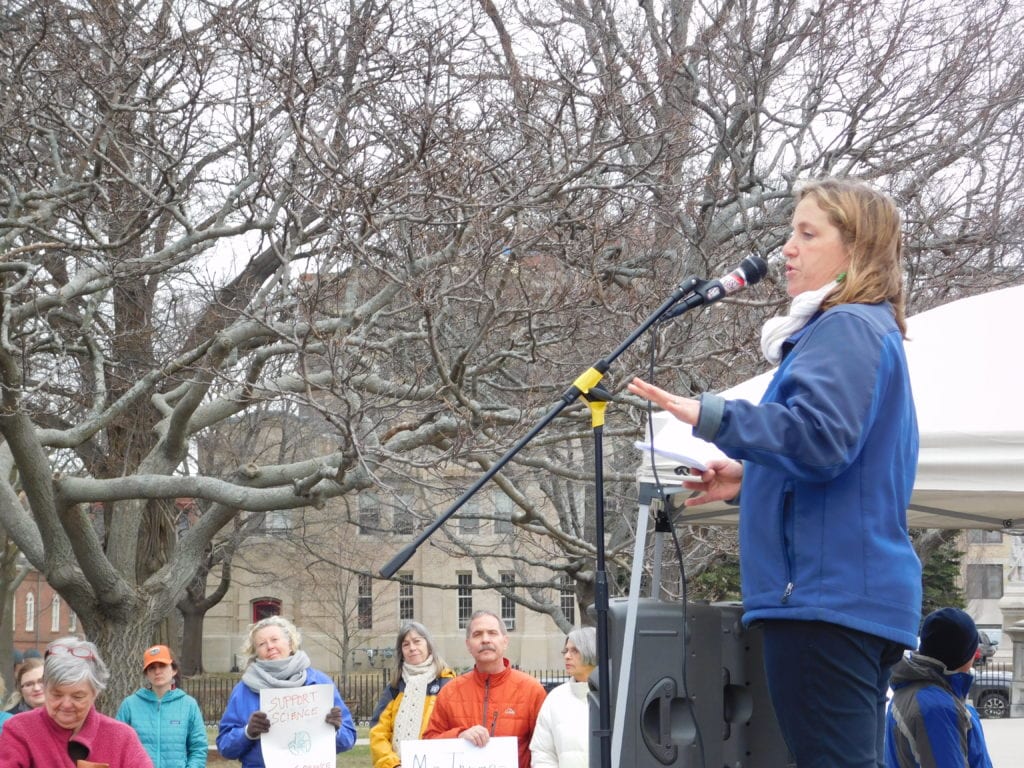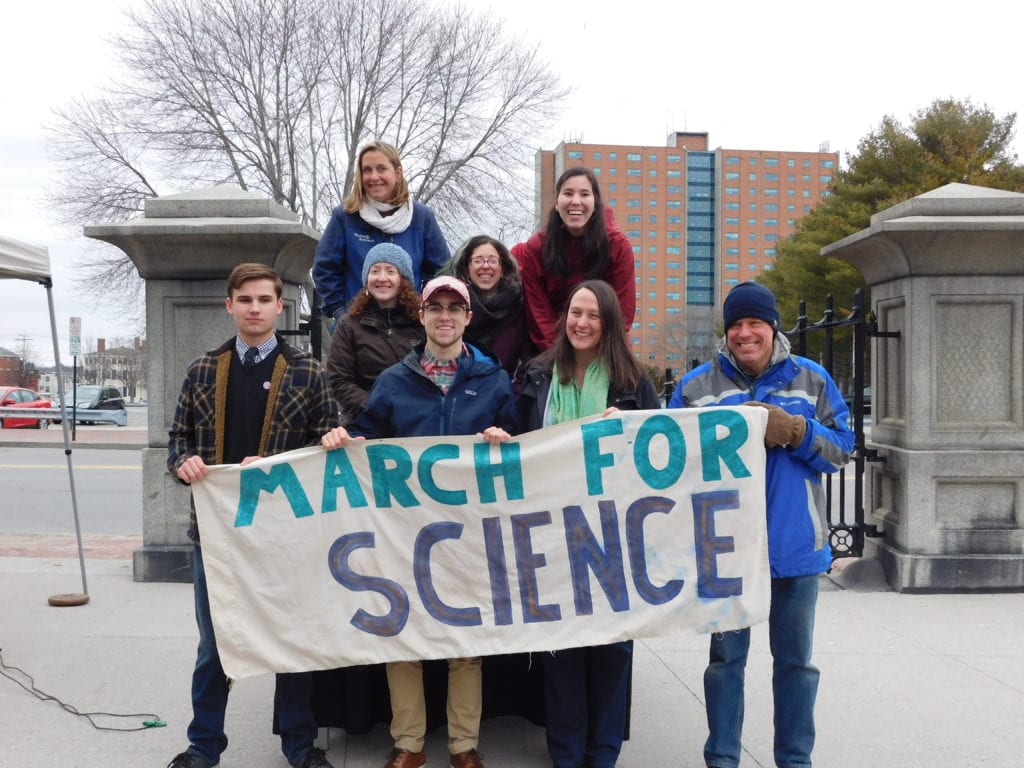
Maine Audubon wildlife biologist Laura Minich Zitske, who leads our Coastal Birds Project, was a featured speaker at Portland’s March for Science yesterday.
Despite the chilly April temperatures, a dedicated corps turned out to support science and its wider inclusion in public policy decision-making. Laura’s remarks, below, focused on the role individuals can play — even without a science background. Citizen scientists are community activists!
Thanks to Laura and all who marched for science in Maine and around the nation! Here’s a snippet of Laura’s remarks:


Laura’s Remarks at the 2018 March for Science in Portland, Maine
Thank you all for being here today. It is a pleasure to join you for the March for Science.
My name is Laura Minich Zitske, and I am a wildlife biologist with Maine Audubon. I’m very lucky to be able to spend my days working to protect Maine’s endangered species, like the Piping Plover and Least Tern.
I am also lucky to live in Maine. You can ask anyone that knows me, I’m a little fanatical — I LOVE MAINE.
I love the clean Sebago lake water that flows from my faucet, which my daughter asserts is the most delicious water in the world. I love that on my short commute to work, I pass fields and forests where I regularly see turkey and deer and other wildlife. I love that my children and I can go swimming on our coasts and ponds knowing the water is clean and safe.
These things would not be possible without science-based policies.
When decision-makers listen to scientists, it’s good for everyone. Science is learning from our experiences — it is collecting information to make BETTER decisions.
A fundamental principle of science is that you need repeated observations to draw strong conclusions. One anecdotal experience can be informative, but it is not conclusive. We need many, many data points to help us better understand the world around us so we can make smart policy changes accordingly.
The great news about this is that ANYONE can and should contribute information to help make better decisions. Science is not only the cliche of an old man by himself in a lab- today, science is all of us. We all can be citizen scientists, and it’s important that we all help provide lots of information so people in power can make better informed decisions.
I am fortunate to work with citizen scientists from all walks of life. They may call themselves volunteer monitors or simply “plover lovers,” but they are more than that. When Mary Findley is out on Wells Beach at dawn, finding camouflaged birds and to sure they stay safe while Town vehicles are on the beach, she is a citizen scientist. When the Old Orchard Beach Public Works crew are out raking the beach but watching for endangered plovers and discovering new nests, they are citizen scientists. And they are making a difference.
That’s my challenge to you all: find a citizen science opportunity that works for you. You don’t need a PhD to understand that science is essential for the health of our world and all of us that live here. And that’s great because you don’t need a PhD to be a citizen scientist and contribute to greater scientific understanding and fact-based decision-making.
You could join the Maine Volunteer Lake Monitoring Program, or participate in Maine Audubon’s Loon Count at your family camp. You could help us learn more about how Maine birds have changed over decades by recording the birds you see for the Second Maine Breeding Bird Atlas — or simply reporting what you see online in eBird. Maybe you fish in remote ponds for a greater purpose with the Brook Trout Survey.
There are too many opportunities to list here. I encourage you: go out there and look at all that is available, and find something the aligns with your own interests. If you are here today, it’s because you know how important science is, and how badly we need it right now.
Increasingly it seems science has become a political issue, being used as a tool to divide parties and people. That is not what science is, and that is not what science should be. Science is not partisan. Curiosity has no political affiliation.
Science considers different ideas and viewpoints. It does everything it can to leave biases and prejudices behind in order to see a problem with clear eyes. It values strong and vigorous debate based on facts and analysis.
This is something we can all strive to practice in our own lives. As citizen scientists, we can ask questions about the world around us, and collect data to understand why it is the way it is. We can think about how we can make the world healthier for all living things. We can listen to each other. We can consider ideas and viewpoints that challenge us. And then we can trust what the carefully-reviewed data and rigorous analysis reveals.
It has become too easy for politicians to ignore the work of scientists these days. With all of us taking part in the scientific process, becoming citizen scientists and spokespeople for science- and fact-based policy-making, we can make sure science is always front of mind for our leaders.
Together, citizen scientists can become the community activists who change the world! I invite you to join me. Let’s geek out together as we march for curiosity, for facts, for science!
